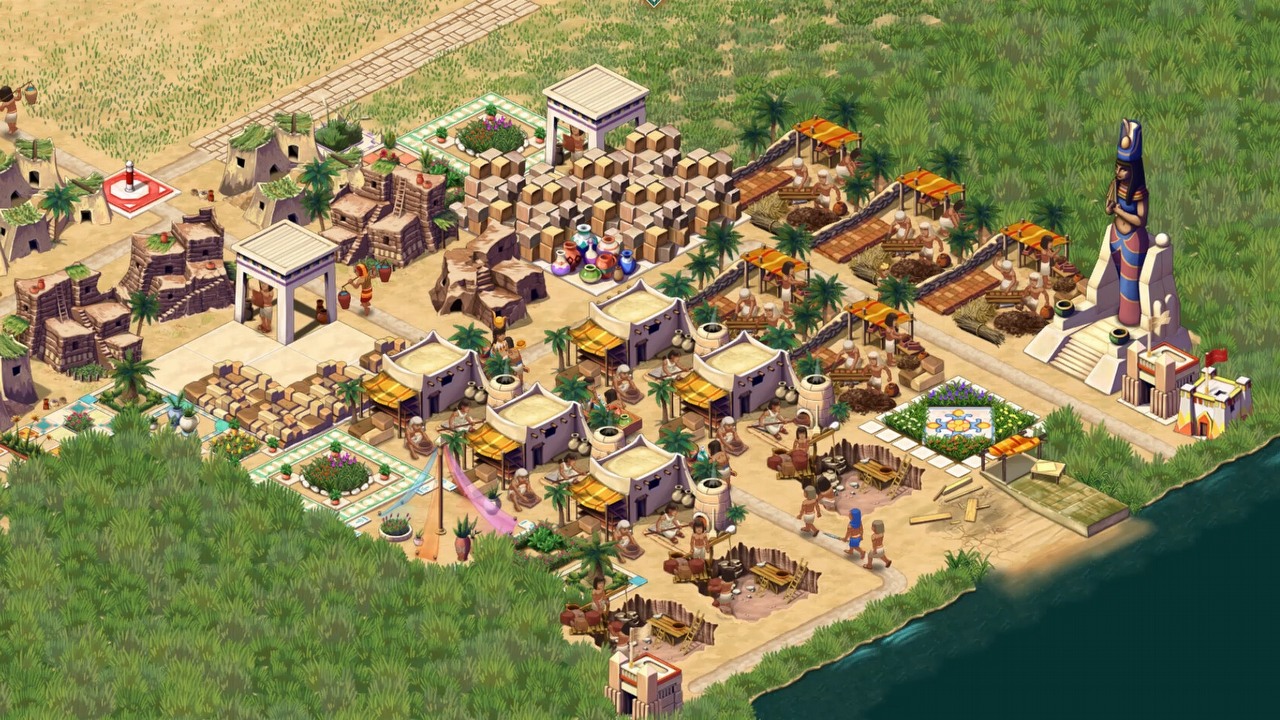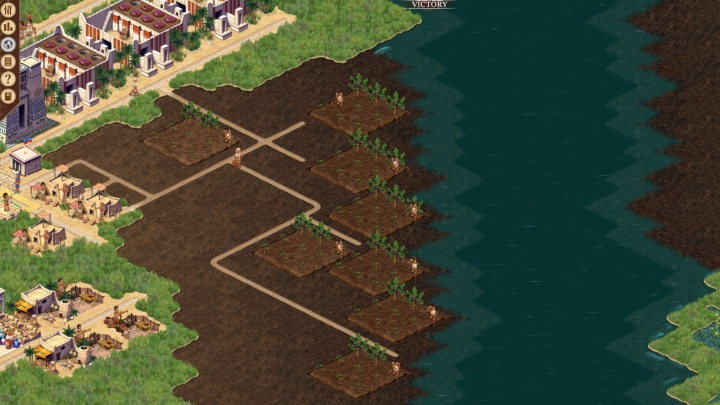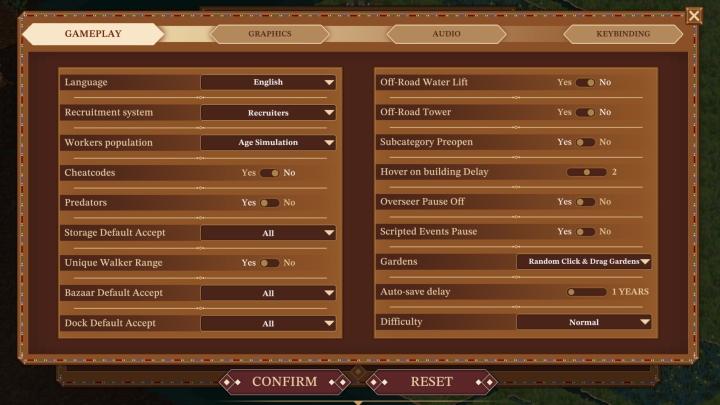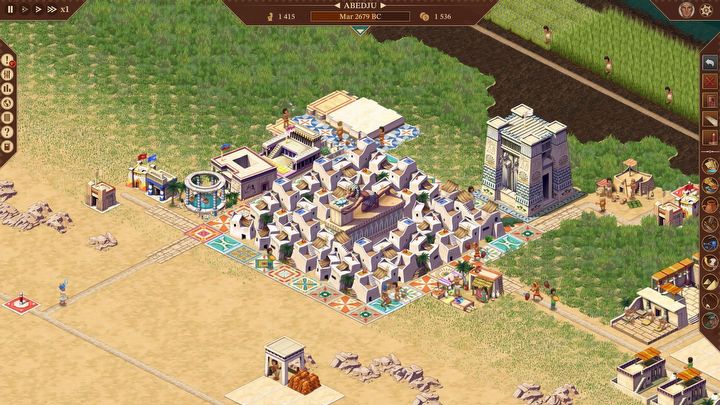Pharaoh: A New Era Beginner's Guide: Tips and Tricks
Do you want to start your adventure in Pharaoh: A New Era? Here you will find tips for getting started.
1

Today marked the debut of Pharaoh: A New Era, a remake of the iconic city builder. If you decide to purchase the game, then below you will find six tips for getting started. With them you will learn the most basic information about the game mechanics.
- Where to start building
- Lay out the city wisely
- Be careful where you place buildings
- Build houses in fours
- Provide the residents with basic services
- Place farms as close to the river as possible
- Surround homes with beautifications structures
- Don't forget about the gods
- Unemployment is better than a shortage of workers
- If the game is too difficult for you, change it in the options
- Trade is the main source of income
- Use roadblocks
Where to start building
Each mission makes you start the construction of the city from scratch. So it is worth remembering that the initial buildings should always be the same:
- Houses – this is the foundation of your empire, from here all workers come.
- Water – water-related buildings are necessary for you to expand your settlement.
- Religion – thanks to temples your cities will flourish, religion is one of the important needs. In addition, you should care about pleasing the gods, as this can bring you favors or curses.
- Food – another basic need that should be met as soon as possible.
- Stock and distribution – especially Bazaar and Granary. You have to stock and distribute food.
- Maintenance buildings – here we mean all the structures that keep an eye on the condition of citizens and their homes (the entire Services tab).
- Entertainment – this is another aspect of life that you should be concerned with. However, buildings in this category do not carry any major positive aspects. Once you satisfy the whims of the citizens, you can forget about them.
- Clay Pit and Potter – these are the last buildings that provide the basic needs of the residents.
Lay out the city wisely
The key to success is to plan the city wisely. Pay attention to how the environment in which you will come to build presents itself. For example, if the settlement is in a dry environment, residential zones must be concentrated around water bodies. Otherwise, you will not be able to provide water to citizens.
It is a good idea to divide the city into districts. This will make it much easier for you to carry out the tasks of prosperity and development of houses to very high levels. In the areas designated for the aristocracy, there should be no warehouses and industrial facilities.
Above you have an example of how a sample residential district should be constructed. As you can see, we built a series of houses around the monument. This provides them all with a beauty bonus. On top of this, it is worth building plaza on the road.
Be careful where you place buildings
Some buildings must be placed in the right spots. For example, farms should be created on fertile land next to the Nile, and Festival Square at a crossroads. Always check the structure description first.
Build houses in fours
As more of your citizens' needs are met, their houses will grow. However, they need other huts to do so. Therefore, try to make sure they are built in fours, so as not to waste the potential for their growth.
Provide the residents with basic services
An important part of the gameplay is to provide residents with access to basic services. First of all, provide them with food and water. Later on, entertainment, faith and health care should also be provided. Without these, homes will not be able to thrive.
Watch to see if food traders, people carrying water, or priests pass by all the buildings. It may turn out that their path ends much sooner and some residents will not have their needs met. Additional public buildings should then be added and a different district plan created for the future. Remember that you can always check whether a building has all its needs met by clicking on it.
Place farms as close to the river as possible

An important aspect of the game is food. As in real Ancient Egypt, a lot here depends on the floods of the Nile. They are not always the same (everything depends on the grace of Osiris) , and the land is not evenly fertile either. So it's best to put farms first near the river itself.
Surround homes with beautifications structures
An important part of a city's functioning is its beauty. This is because it determines whether a house will be able to develop to a higher level. Buildings can reflect positively or negatively on the appearance of the neighbourhood. For example, if you put up factories and workshops, the aesthetics in the area will automatically deteriorate.
Therefore, a good way to do this is to isolate houses from their surroundings with a small layer of gardens and other beautifications structures. Alternatively, if you don't have the money, leave space for them and put them up later. This way the beauty of the surroundings will increase and the houses will be able to develop freely.
Don't forget about the gods
A whole roster of Egyptian gods appears in the game. Each of them has its own satisfaction bar for how you worship him or her. If the god is happy then they will send a blessing. On the other hand, however, if you anger a particular deity then a disaster will hit your city. Therefore, be sure to erect temples and hold regular festivals.
At the same time, don't forget that your city always has a main god. If he or she has the same or fewer shrines compared to the other gods of the metropolis, they may feel offended. Therefore, the main god, which is marked with the eye icon at the Overseer of the Temples, should always have at least one more shrine.
Unemployment is better than a shortage of workers
Every building in the city needs an adequate number of workers. If staffing is insufficient then the productivity of the facility will be lower. This will translate into longer production times and less frequent patrols of the area. Therefore, you need to keep an eye on having a slight excess of workers. Then you will be sure that everything is running at full capacity.
On the other hand, unemployment must not be too high, as crime will start to rise. In that case, it is worth considering whether to invest in new warehouses or production lines, on which the city will earn extra money through exports.
If the game is too difficult for you, change it in the options

There are many possibilities in the options that will make the game easier for you. For example, you can disable the simulation of the age of employees or the system of recruiters. Seemingly, these small changes can seriously affect the level of difficulty of the game.
Trade is the main source of income
The initial money in Pharaoh will run out quickly. So you should start earning before that happens. On some maps you have access to gold. This is an easy way to earn money, so try to build mines as soon as possible. However, it is not always possible.
After building a palace, you will receive a steady income from taxes. However, this is an insufficient amount to cover all expenses. Therefore, you must start trading.
When you start a new mission, first of all you have to think about what is your main source of income (which you can create without importing anything) and establish production chains so that you can start producing this good in sufficient quantities as soon as possible. Of course, remember that you have to expand the rest of the economy proportionally.
Use roadblocks
If you create a city connected by a complex network of roads, remember that you can restrict workers from moving around. You will do this by using roadblocks. With them you can separate sections of your settlement into distinctive districts. Although keep in mind that not all parts of the city need to be connected to each other. You can create several independent zones.
1

Author: Agnes Adamus
Associated with gamepressure.com since 2017. She started with guides and now mainly creates for the newsroom, encyclopedia, and marketing. Self-proclaimed free-to-play games expert. Loves strategy games, simulators, RPGs, and horrors. She also has a weakness for online games. Spent an indecent number of hours in Dead by Daylight and Rainbow Six: Siege. Besides that, she likes horror movies (the worse, the better) and listen to music. Her greatest passion, however, is for trains. On paper, a medical physicist. In fact, a humanist who has loved games since childhood.
Latest News
- You won't regret hitting “Update” anymore. Valve brings mod revolution to Steam
- Shroud says ARC Raiders devs have lost control. The studio issues a statement
- Bigger than Red Dead Redemption 2? Crimson Desert challenges legends and promises scale that overwhelms
- Lords of the Fallen 2 devs have been accused of copying FromSoftware. „Indispensable evidence” in their defense failed to convince players
- Beloved mechanic from Fallout 3 almost didn't make it into the cult RPG. Bethesda was afraid that no one would use it



